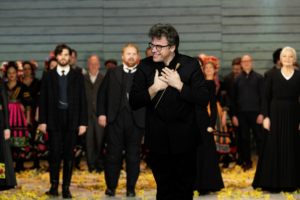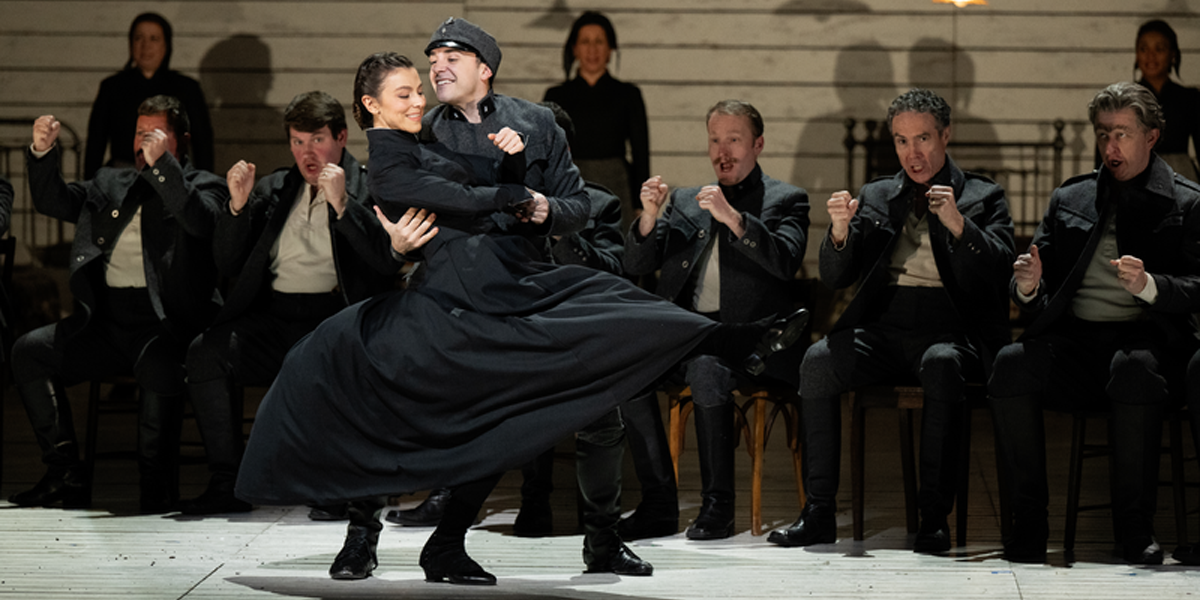This revival of Claus Guth’s 2021 production of Jenůfa is a triumph largely thanks to Czech conductor Jakub Hrůŝa. Making his highly anticipated debut as Covent Garden’s Music Director Designate, Hrůŝa brings extraordinary depth to Janáček’s score, injecting it with vivid intensity and authentic Moravian spirit. His attention to detail—such as incorporating the original xylophone from the opera’s first performances in Brno—demonstrates his profound connection to the composer and his culture. Hrůŝa’s mastery of tempo, texture, and dramatic pacing creates a gripping musical experience that cements him as one of today’s leading interpreters of Janáček.
Jenůfa, Janáček’s first major opera, is rooted in the composer’s personal grief; it was composed during the illness and death of his daughter Olga and is dedicated to her memory. The story, based on Gabriela Preissová’s play Her Stepdaughter, scandalized audiences with its brutal themes, drawn from real-life crimes: a jealous lover disfiguring a woman’s face and the discovery of a dead baby. Set in a Moravian village, the opera explores betrayal, sacrifice, and redemption as Jenůfa’s stepmother, Kostelnička, kills Jenůfa’s illegitimate child to secure her future.
Karita Mattila, who sang the role of Jenůfa two decades ago, now embodies Kostelnička with gripping vocal and dramatic intensity. Her portrayal of the tormented stepmother is riveting, and she remains a magnetic stage presence. Corinne Winters, taking on the title role, offers a tender and vulnerable interpretation, though her voice lacks the richness and projection of her predecessor, Asmik Grigorian. Nicky Spence, as Laca, impresses with his deep understanding of the role, although his voice occasionally struggles to carry in the production’s expansive set design. Thomas Atkins is well-cast as Steva, the feckless lover, and Jonathon Lemalu makes a strong impression in a smaller role as the Mayor.
Guth’s production is striking, if not without its challenges. The black-drenched sets, symbolic shutters, and a half-raven stalking the shadows create a somber, oppressive atmosphere that mirrors Jenůfa’s stifling world. The Act II cage, representing Jenůfa’s confinement, is particularly effective, while Act III’s colorful costumes and lively folk dances offer a brief but welcome contrast. However, the open design of the set often absorbs sound, muting the singers when they are not facing the audience—a flaw that detracts from the overall impact.
The Czech language, notoriously challenging for non-native speakers, is delivered impeccably thanks to language coach Lada Valeŝovà’s expertise. It is puzzling, however, that no Czech singers are featured in this production, despite its cultural roots.

Ultimately, Hrůŝa’s conducting is the standout element of this Jenůfa. From the first downbeat, he crafts a performance that is both electrifying and profoundly moving. His dynamic use of tempo and phrasing brings Janáček’s characters to life, while his understanding of Moravian folk traditions adds authenticity to the music. Hrůŝa’s interpretation captures the full emotional spectrum of the score, from searing drama to moments of lyrical beauty.
Receiving a rare standing ovation, Hrůŝa firmly establishes himself as a conductor of remarkable insight and artistry. His debut at Covent Garden heralds an exciting new era for the Royal Opera House, and this Jenůfa is a production that should not be missed.
Music by Leoš Janáček (1854-1928) Brno Version
Libretto Gabriela Preissová (based on her play Jeji pastorkyňa)
First performance 25th January 1909 Semperoper Dresden, Germany
Conducted by Jakub Hrůŝa
Directed by Claus Guth
Photo Credit Camilla Greenwell
Cast includes Corinne Winters, Karita Mattila, Nicky Spence, Thomas Atkins, Hanna Schwartz, James Cleverton, Jonathan Lemalu, Marie McLaughlin, Valentina Puskàs, Kirsty McLean
Running time 2 hours 55 minutes with two intervals

